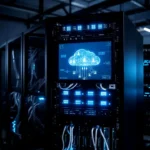Artificial Intelligence (AI) has emerged as a transformative force, revolutionizing various industries and reshaping the job landscape. As AI technologies advance rapidly, concerns regarding their impact on job markets and the skills required in the future have gained prominence. In this article, we will analyze the profound impact of AI on job markets and the skills that will be crucial for future success.
Automation and Job Displacement
One of the primary concerns surrounding AI in job markets is the potential for job displacement through automation. AI-powered systems and robots are increasingly capable of performing routine, repetitive tasks that were once exclusively done by humans. As a result, certain highly rule-based and predictable jobs—including manufacturing, data entry, customer service, and transportation jobs—are at threat of being replaced by AI-driven automation.
While automation may eliminate certain job roles, it also creates new opportunities. As AI takes over mundane tasks in job markets, it frees human employees to focus on more complex, creative, and value-added activities that require human ingenuity, emotional intelligence, and critical thinking. Artificial Intelligence is rapidly transforming our world, opening new opportunities for businesses and individuals.
AI Transforming Existing Roles
AI in job markets often transforms existing job roles rather than entirely replacing human workers. It augments human capabilities, enabling workers to become more efficient and effective. AI technologies can explore vast data, provide valuable insights, and support decision-making processes. For example, AI-powered analytics tools can assist doctors in diagnosing diseases by quickly analyzing medical images or help marketers make data-driven decisions based on consumer behavior patterns.
As AI in job markets grows, it will increasingly collaborate with humans, amplifying their abilities and enabling them to focus on higher-level tasks that require creativity, problem-solving, and strategic thinking. This shift will require workers to acquire new skills and adapt to working alongside AI technologies. While some fear AI in job markets that Artificial Intelligence may one day replace human workers, others see it as a way to enhance our abilities and create new jobs.
The Emergence of New Job Roles
While AI may eliminate certain job roles, AI in job markets also creates new opportunities and new job roles. As AI becomes more integrated into various industries, there will be a growing demand for experts who can develop, implement, and maintain AI systems. These roles may include AI engineers, data scientists, machine learning specialists, and AI ethicists who ensure the reliable and ethical use of AI technologies.
Additionally, AI will create jobs in fields that intersect with AI technologies, such as human-AI interaction designers, AI trainers, and explainability experts. These roles will be crucial in designing AI systems that are intuitive, trustworthy, and aligned with human values.
Importance of Soft Skills
While AI excels in tasks requiring data analysis and pattern recognition, it still lags in areas involving human emotions, empathy, and social intelligence. As a result, the need for soft skills is expected to rise, especially in the future job market. Skills such as emotional intelligence, originality, critical thinking, collaboration, and adaptability will become increasingly valuable. These skills are uniquely human and cannot be easily replicated by AI.
AI in job markets will be essential for complex problem-solving, innovation, teamwork, and building relationships with clients and customers. Developing and honing these soft skills will be crucial for individuals to remain relevant and competitive in the future job market. One of the most exciting applications of Artificial Intelligence is in autonomous vehicles, where self-driving cars are poised to revolutionize transportation.
Lifelong Learning and Upskilling
As AI technologies evolve and job requirements change, continuous learning and upskilling will become essential for professionals to stay employable. The pace of technological advancement means that skills that are needed today may become obsolete tomorrow. Therefore, individuals must embrace a mindset of lifelong learning, actively seeking opportunities to acquire new skills and stay updated on the latest technological developments.
Organizations and educational institutions also play a vital role in supporting lifelong learning. They should offer training programs, reskilling initiatives, and flexible learning opportunities to empower individuals to adapt to the changing job market and acquire the skills needed for the AI-driven future. Artificial Intelligence is also being used to improve the accuracy and speed of medical diagnoses, leading to better patient outcomes.
Conclusion
Artificial Intelligence is undoubtedly reshaping job markets, leading to the automation of certain tasks, the transformation of existing roles, and the emergence of new job opportunities. While there may be concerns about job displacement, AI in job markets also presents immense possibilities for collaboration between humans and machines, enabling workers to focus on higher-level tasks that require uniquely human skills. Whether we are ready or not, Artificial Intelligence is here to stay, and it is up to us to ensure that it is used for the greater good.
To successfully navigate AI’s impact on job markets, individuals must embrace lifelong learning, develop soft skills, and adapt to the changing demands of the job market. By continuously upskilling and remaining adaptable, individuals can position themselves for success in the AI-driven future, where human ingenuity and creativity are invaluable assets alongside advanced technological capabilities.







